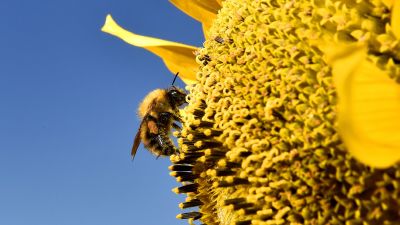What is a 'pollen bomb' and does 'super pollen' exist? Debunking some of summer's weather myths

Firstly, let's put the record straight. There is no such thing in meteorology as a "pollen bomb" or so-called "super pollen".
They are totally non-scientific words, completely made up in the moment.
The term "pollen bomb", "super pollen" and "thunder fever" have been floating around in the media for a number of years and are phrases used to dramatise large pollen releases.
However, the conditions these terms are used to describe are very real - as any hayfever sufferer will tell you.
During prolonged dry warm spells, pollen is released in abundance leading to high levels of pollen in the atmosphere.
High pressure and light winds prevent the pollen being dispersed more easily, meaning that levels remain high to very high, peaking during the early morning and late evening.
The grass pollen season occurs from the end of May to early August, and this affects 95% of hay fevers sufferers across the UK.
We tend to get two peaks in grass pollen season because of the number of grass species. The first normally occurs in the first half of June and then another one in early July.
There are around 150 different grass species and they all flower at slightly different times, but only a handful of these are allergenic.
So although you'll never hear any meteorologist or weather presenter use the term "pollen bomb", it's sometimes used as a shorthand to describe peaks in the pollen count - and that can have a real impact on hayfever sufferers.
What is 'thunder fever'?
Thunder fever is another term occasionally used, but again is non-scientific.
However, thunder asthma is being research further, although it is not understood very well.
It is thought thunderstorms have the ability to increase hayfever symptoms in sufferers.
This is still undergoing further research.
What's the pollen forecast for this week?
Through this week, temperatures are expected to rise to the mid to high 20s, possibly into the low 30s, providing the first hot spell of the year.
The winds will remain light, meaning any pollen which is released will not disperse easily.
This onset of warmer weather looks set to coincide with the first peak in the grass pollen season.
With all these factors coming together this week, it's not great news for hay fever sufferers.
Top tips if you suffer from hay fever
If you do suffer from hay fever, the best advice is to take your antihistamine in advance and do anything to prevent getting pollen into your eyes.Simple things such as washing your hands, not touching your eyes and possibly taking a shower if you've been outside will help to wash away the pollen that may be in your hair.
Want a quick and expert briefing on the biggest news stories? Listen to our latest podcasts to find out What You Need To Know